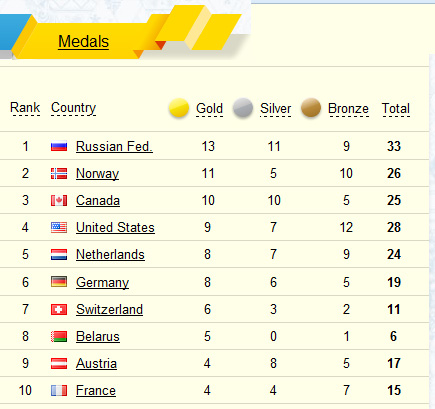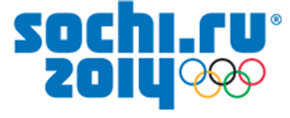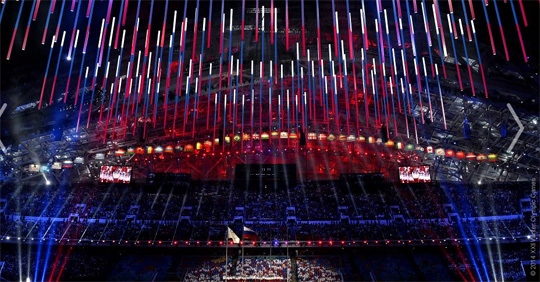Russia Tops With Olympics Medals In Sochi; U.S. Is 4th
February 24, 2014
The 22nd Olympic Winter Games have ended. Here are some highlights of the two plus weeks of action.
Only three gold medals were awarded on the final day and two of them went to host Russia. The Russians swept the medals in Sunday’s first event, the men’s 50-kilometer cross-country ski race. Alexander Legkov won it with a time of 1:46.55.2
That was 0.7 of a second faster than teammate Maxim Vylegzhanin (1:46.55.9) and 0.8 better than bronze medalist Ilia Chernousov (1:46.56.0).
 Russia won its first-ever gold medal in the four-man bobsled, as driver Alexander Zubkov made it a clean sweep, after earlier in the games winning the two-man event.
Russia won its first-ever gold medal in the four-man bobsled, as driver Alexander Zubkov made it a clean sweep, after earlier in the games winning the two-man event.
Russia unexpectedly ended up on top of the medals table, with 13 gold, 11 silver and nine bronze for a total of 33. At the 2010 Vancouver Olympics the Russians were back in 11th place with three gold, and sixth in total medals won with 15.
International Olympic Committee President Thomas Bach said he was pleased to see the Russians do so well before enthusiastic fans.
“It is not just enough to organize the Games, but you also need a good home team. So they were working hard after the shock they had in Vancouver ,” Bach said. “And I think it is just remarkable the progress that has been made within four years from Vancouver until today, so can we only congratulate the Russian team for this great success.”
Also at his closing news conference, Bach said the response from all the participants – athletes, National Olympic Committees, international sports federations, sponsors and broadcasters – has been overwhelmingly positive.
He added that in speaking to many athletes, after spending four nights in different Olympic villages, he did not hear one complaint.
“They loved the sports facilities, the quality of the Olympic villages,” Bach said. “What impressed (them) the most was the proximity of the Olympic villages and their venues.”
Second to Russia in the gold medal count was Norway with 11. Canada was third with 10, one more than the United States, by successfully defending its men’s ice hockey title with a 3-0 win over Sweden. That was the final sporting event of the Games.
The United States was second behind Russia in total medals with 28, while Norway had 26 and Canada 25.
In all, 26 nations won medals at the Sochi Olympics, the same number as in Vancouver.
Bach said that even though so much attention has been given to the huge cost to stage these Olympics, estimated at $50 billion, Sochi’s operational costs were about the same as Vancouver.
He emphasized that the investment in the region for infrastructure will be here a long time – new roads, railroads, housing, sports venues, winter training facilities and more. Sochi will host a Formula One auto race and 2018 World Cup football games.
 “This project was not limited to just building a winter sports center,” Bach said. “It was about the transformation of a whole region into a modern destination for tourists, for conventions and for sports. And it was amazing what happened here.”
“This project was not limited to just building a winter sports center,” Bach said. “It was about the transformation of a whole region into a modern destination for tourists, for conventions and for sports. And it was amazing what happened here.”
Five athletes tested positive for banned substances during the Sochi Games, including Austrian cross-country skier Johannes Duerr on the final day. His expulsion for the red blood cell booster EPO prevented him from competing in Sunday’s 50-kilometer race.
The other four testing positive were a Ukrainian cross-country skier (Marina Lisogor), a German biathlete (Evi Sachenbacher-Stehle), a Latvian ice hockey player (Vitalijs Pavlovs) and an Italian bobsledder (William Frullani). Those four other cases involved minor stimulants that can be found in food supplements. None of the five had won medals.
As for the United States, a number a favorites like two-time Olympic snowboard halfpipe champion Shaun White failed to make the podium, while other underdogs came through. Alan Ashley is the chief of sport performance for the USOC.
“There is always at the Olympics times when you are like going, ‘Oh my gosh, I wish so and so had done better,’ but just as many times there is like a whole new generation of athletes or a new group of athletes that surprise you, and that is the beauty of the Games,” Ashley said.
But the U.S. figure skating team had its worst Olympics showing since 1936 with no medals in men’s, women’s or pairs, and the long track speed skating team had its worst Olympics ever.
“Our job now is to say, OK, what went wrong, what went right?,” said Ashley. “How do we improve so that the next generation, when we go into Pyeongchang (in 2018) that we have corrected some things and moved this forward so that that group of athletes and that group of skaters that goes with us to the next Olympic Games has an even better opportunity to perform?”
The United States did come through with one notable performance in figure skating, as Meryl Davis and Charlie White won the first-ever Olympic gold medal for their country in ice dancing.
[VOA]




Comments